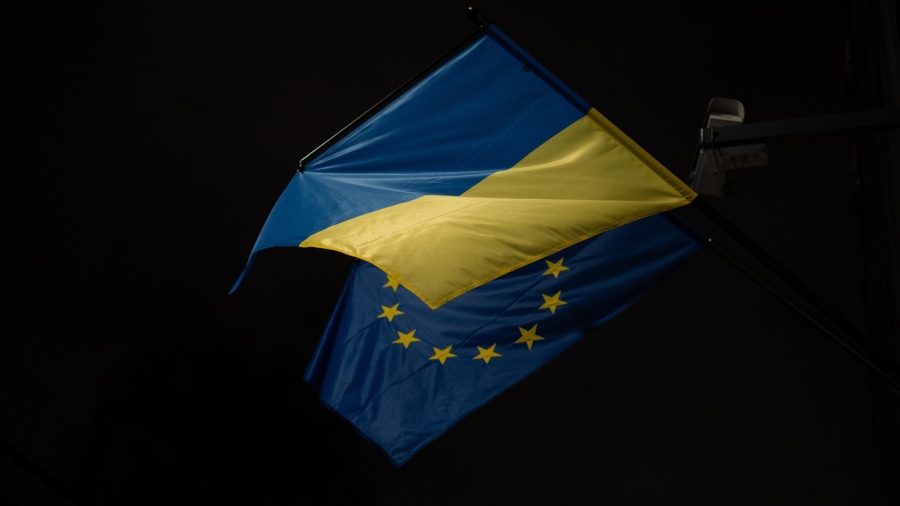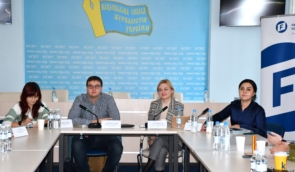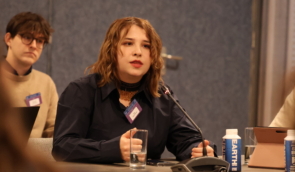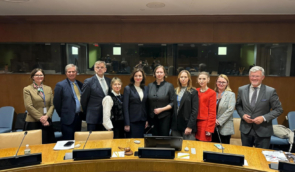The coalition of NGOs presented to the European Commission the Shadow Report on Chapter 23 “Justice and Fundamental Rights”
A coalition of civil society organizations — the Agency for Legislative Initiatives, Transparency International Ukraine, the Human Rights Centre ZMINA, Tomorrow’s Lawyer and the Ukrainian Bar Association — presented to representatives of the European Commission the Shadow Report for Chapter 23 “Justice and Fundamental Rights” of the European Commission’s Report on Ukraine in 2023 year.

This is the first report that the public sector of Ukraine has prepared for the European Commission after receiving the status of a candidate for EU membership. The Shadow Report highlights the point of view of Ukrainian civil society, representatives of the legal community and experts who are actively working in the field of justice. The report analyzes the progress achieved in the areas of the rule of law, the fight against corruption, the protection of fundamental human rights and freedoms, it identifies weaknesses, gaps and provides recommendations on what needs to be done on the Ukrainian side.
“This Shadow Report offers a more holistic and transparent vision of the course of reforms in Ukraine. It is an important tool for preparing for negotiations on joining the EU — both for the Ukrainian side and for the EU. The shadow report was provided to the Ukrainian authorities and the Ukrainian delegation, which next week will take part in bilateral meetings regarding Section 23,” Oksana Tsymbrivska, Head of the European Union Project “Pravo-Justice”, commented on the importance of the report.
Manfredas Limantas, Head of the Rule of Law and Anti-corruption Sector of the EU Representation in Ukraine, highly praised the level of preparation of the Shadow Report:
“I have never seen such a serious report prepared by civil society – in any country where I have worked before. We will use this Report when formulating our recommendations for the Screening Report, as well as when considering the draft roadmap for rule of law reforms that Ukraine will need to prepare to move forward on its path to EU accession. And, of course, these materials will be used to guide the accession negotiations. Therefore, the report is very timely from the point of view of our work with Ukraine,” Manfredas Limantas noted.
In its part of the report, the Agency for Legislative Initiatives emphasized the need to adopt a judicial reform strategy. Unfortunately, Ukraine does not currently have it as a single approved document. The reform is being implemented under pressure from the public and international partners. Only now, the President’s Office has drafted and sent a Strategy for the Development of the Justice System and Constitutional Justice for 2024-2029 to the main judicial bodies and some representatives of the non-governmental sector for suggestions and comments. This draft Strategy needs to be substantially revised, and the Agency for Legislative Initiatives is already preparing its proposals.
“We made a brief analysis of this document and found problems. First and foremost, the document in some areas of reform violates the independence of the judiciary. Second, it does not list current problems but instead describes how and what needs to be reformed. But what is the purpose of such changes if it is not specified what specific problems they solve? And thirdly, many points of the Strategy are not actually a strategy,” Karyna Aslanian, Head of the Rule of Law Division of the Agency for Legislative Initiatives, noted during the presentation of the report.
In turn, Manfredas Limantas expressed hope that the recommendations of civil society will be taken into account by the Office of the President to improve the Strategy.
Yevhen Krapyvin, a Criminal Justice Expert with the “Tomorrow’s Lawyer” program and the Center for Political and Legal Reforms, focused on the problems and recommendations for their solution regarding the prosecutor’s office system of Ukraine. The speaker emphasized the need for the independence of the prosecutor’s office and the Prosecutor General, in particular from political influence, and the development of institutions that should ensure this independence.
“The Prosecutor’s Office in Ukraine developed significantly after the Revolution of Dignity — prosecutors became more independent, in particular due to the functioning of prosecutorial self-government. At the same time, there remain issues of quality personnel selection, especially for management positions, response to threats to independence, depoliticization of the appointment/dismissal procedure of the Prosecutor General, etc. All these things are found in the recommendations of the EU, the Council of Europe, GRECO and other organizations. The shadow report should give the European Commission a broader picture of the state of development of the prosecutor’s office as an institution of justice, supplementing the report of the official delegation,” Yevhen Krapyvin noted.
The Executive Director of the “Tomorrow’s Lawyer” program, Daria Pysarenko, presented the main conclusions, problems and recommendations for the section on the reform of the legal profession. In particular, she disclosed the issue of the legal status of the bar, issues of bar self-governance, and disciplinary responsibility — all aspects characterizing the current structure of the bar’s organization.
“The legal profession is an important element of the judicial system as such, but currently it is not transparent, accountable and under the control of society and the legal community. Questions regarding the election of representatives to the Supreme Council of Justice, the need to re-elect the self-governing bodies of the bar and change the election rules, the monopolization of continuous professional development, non-transparent procedures for access to the profession, the risks of disciplinary abuse – in modern conditions, the independence of lawyers is rather declared than observed. At the same time, advocacy is a component of the justice sector that will not be fully successful without an institutionally developed, independent advocacy. Therefore, a detailed analysis of this area should become the necessary driving force for change,” Daria Pysarenko concluded.
A full-fledged reform of the justice system is impossible without solving the problems with legal education in Ukraine. Every year, Ukrainian universities graduate thousands of lawyers, however, the quality of this education does not meet European standards. Recommendations of civil society regarding necessary changes in education were voiced by Ivan Horodyskyi, Vice President of the Ukrainian Bar Association.
“The irrelevance of legal education in Ukraine is caused primarily by a special post-Soviet legacy, which even in modern conditions does not leave the projection of the outdated Soviet vision of the Law. Today, we must promote modern human-centred education for the purpose of justice. Of course, we should not forget about the optimization of the legal education system. That is why we propose to reform the financing of education in favour of grant proposals. This will lead not only to reducing the burden on state resources but also to increasing the motivation of talented students, who are the basis of the modern legal process,” Ivan Horodyskyi noted.
Kateryna Ryzhenko, Deputy Executive Director of Transparency International Ukraine for legal issues, presenting the section on the fight against corruption, emphasized the need to improve anti-corruption legislation and the urgent need to take into account the shortcomings of the previous State Anti-Corruption Strategy and State Anti-Corruption Program in the process of developing new documents, because this process will begin already very soon. Also, within the framework of her presentation, Kateryna mentioned the importance of fully restoring electronic declaration and reporting of political parties.
“The fight against corruption is a comprehensive issue. The recommendations provided by us are very specific and applied, but at the same time, they comprehensively cover areas related to the prevention and fight against corruption. We have been talking about some of the problems raised for a long time, but there are also those that arose precisely in the process of negotiations with the European Union,” summarized Kateryna Ryzhenko.
The Head of the Board of the Human Rights Centre ZMINA, Tetiana Pechonchyk spoke about the main challenges to the observance of a wide range of human rights in Ukraine, which Ukraine will have to deal with on the way to the EU.
“The peculiarity of the Ukrainian situation is that the country is undergoing a European integration transformation during a full-scale war, and in connection with this, we have many problems that are unique to Ukraine and that were not faced by other countries – how to ensure justice and punishment of war criminals while the colossal scale of the crimes committed, how to protect the rights of victims of Russian aggression, including residents of the occupied territories. We hope that issues of human rights compliance in the context of de-occupation and reintegration will also be in the focus of the EU,” Tetiana Pechonchyk emphasized.
Tetiana Pechonchyk also drew attention to negative trends in the field of human rights protection, in particular, the intention to limit access to information and decisions of the Unified State Register of Court Decisions through draft law No. 7033d, which, despite criticism from human rights defenders, was adopted by the Verkhovna Rada.
Monitoring, analysis and preparation of the Shadow Report were carried out in February-August 2024. The text of the report is available in Ukrainian and English.
The report was prepared with the financial support of the European Union within the EU Project “Pravo-Justice”. Its content is the sole responsibility of (name of organization) and other public organizations and does not necessarily reflect the position of the European Union.
If you have found a spelling error, please, notify us by selecting that text and pressing Ctrl+Enter.















